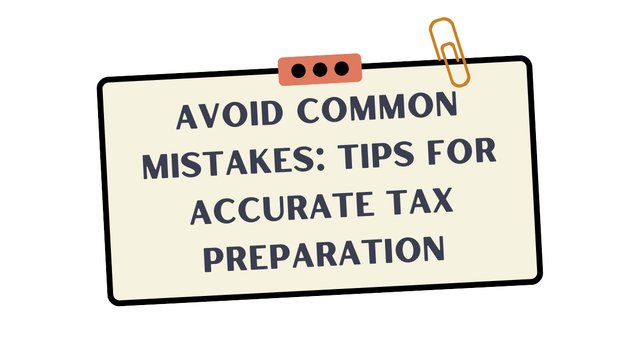Avoid Common Mistakes: Tips for Accurate Tax Preparation
Accurate tax preparation is essential for all taxpayers to ensure that they are paying the correct amount of taxes and avoiding any penalties or fines.
Taxpayers who make mistakes during tax preparation may end up overpaying or underpaying their taxes, which can lead to financial and legal consequences.
Some of the most common mistakes that taxpayers make during tax preparation include failing to gather all necessary information, overlooking changes in tax law, making simple math errors, and forgetting to sign and date their tax returns.
The purpose of this outline is to provide taxpayers with tips and strategies for avoiding common mistakes during tax preparation.

Gather All Necessary Information
Types of Income to Report: Taxpayers must report all types of income on their tax returns, including wages, tips, self-employment income, and investment income. Failure to report all income can result in penalties and fines.
Documents Needed for Deductions and Credits: Taxpayers who plan to claim deductions or credits on their tax returns must gather all necessary documentation, such as receipts, invoices, and other proof of expenses.
Forms for Self-Employment Income: Taxpayers who are self-employed must file additional forms, such as Schedule C, to report their income and expenses accurately.
Why might preparing taxes be different for people living in different states? Tax preparation can vary by state due to differences in state tax laws and regulations, tax rates and deductions, and state-specific tax forms and requirements.
Why Tax Preparation Varies by State
State Tax Laws and Regulations: Each state has its own tax laws and regulations that taxpayers must follow. These laws can differ significantly from federal tax laws, and failure to comply with state tax laws can result in penalties and fines.
Differences in State Tax Rates and Deductions: State tax rates and deductions can vary widely, depending on where taxpayers live. Some states have no income tax, while others have high-income tax rates.
State-Specific Tax Forms and Requirements: Many states have their own tax forms and requirements that taxpayers must follow, in addition to federal tax forms. These requirements can include filing deadlines, additional taxes, and specific reporting requirements.
Be Aware of Changes in Tax Law
Recent Tax Law Changes: Tax laws can change frequently, and taxpayers must stay up-to-date with any changes that may affect their tax returns. Recent tax law changes include changes in tax rates, income brackets, and deductions.
Changes in Tax Rates and Income Brackets: Taxpayers must be aware of any changes in tax rates and income brackets, as these can have a significant impact on how much they owe in taxes.
How to Stay Informed About Tax Law Changes: Taxpayers can stay informed about tax law changes by regularly checking the IRS website, consulting with tax professionals, and subscribing to tax-related publications.
Avoid Simple Math Errors
Common Math Mistakes: Simple math errors, such as miscalculating deductions or credits, can lead to significant discrepancies on tax returns. Taxpayers should double-check all calculations and use tax preparation software to minimize errors.
Importance of Double-Checking Calculations: Double-checking calculations is essential for ensuring the accuracy of tax returns. Taxpayers who are unsure about a calculation should consult with a tax professional.
Using Tax Preparation Software to Minimize Math Errors: Tax preparation software can help minimize math errors by automatically calculating deductions, credits, and other tax-related information.
Don't Forget to Sign and Date
Importance of Signing Tax Returns: Taxpayers must sign their tax returns to certify that the information provided is accurate and complete. Failure to sign tax returns can result in penalties and delays in processing.
Penalties for Not Signing: Taxpayers who do not sign their tax returns can face penalties and fines. In some cases, the IRS may also reject the tax return and require the taxpayer to resubmit a signed copy.
Date Tax Returns Before Submitting: Taxpayers should also ensure that their tax returns are dated before submitting them to the IRS.
This can help prevent processing delays and ensure that the tax return is considered filed on time.
Seek Professional Assistance if Necessary
Benefits of Hiring a Tax Professional: Taxpayers who are unsure about how to prepare their tax returns or who have complex tax situations may benefit from hiring a tax professional.
A tax professional can help ensure that tax returns are accurate and complete and can provide advice on tax planning and other tax-related issues.
When to Consider Hiring a Professional: Taxpayers who have self-employment income, investment income, or multiple sources of income may benefit from hiring a tax professional.
Similarly, taxpayers who have experienced major life changes, such as marriage, divorce, or the birth of a child, may also benefit from professional assistance.
Finding a Reputable Tax Professional: Taxpayers should do their research before hiring a tax professional, including checking credentials and reviews from other clients.
The IRS also provides a directory of tax professionals who are authorized to prepare tax returns.
Read also: What is a Disposable Email Address
The bottom line
To ensure accurate tax preparation, taxpayers should gather all necessary information, be aware of changes in tax law, avoid simple math errors, sign and date tax returns, and seek professional assistance if necessary.
By avoiding common mistakes during tax preparation, taxpayers can ensure that they are paying the correct amount of taxes and avoiding any penalties or fines.
Finally, taxpayers should remember to file their taxes on time to avoid any penalties or fines for late filing. The IRS deadline for filing taxes is typically April 15th, although this deadline may vary in some years.